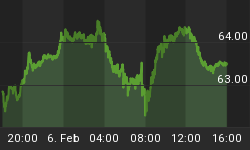Gold Slips But Inflation Fears "to Dominate" as China Grows Output & Strategic Reserves
THE PRICE OF GOLD ticked lower in Asia on Wednesday, holding below $950 an ounce in early London trade as world stock markets added to Wall Street's strong overnight close.
"Gold [on Tuesday] had all the makings of a beautiful technical reversal," writes Russell Browne at London market-maker Scotia Mocatta, "but the late bounce keeps the risk to the topside."
Pointing to support at $950 and then $934, he pegs resistance at $961 and then $966.
"I would be surprised if we don't reach a new high by the end of the year," said Chuck Jeannes, CEO of GoldCorp - the world's No.2 Gold Mining stock by value - at a conference yesterday.
"Markets move based on fear and expectation of what's going to happen, not when it actually does. [So] whether inflation appears in a year or six months or two years, we're focusing long term, and I do think it's going to dominate the trade in gold for a long time to come."
Consumer prices fell in Germany this month acording to regional surveys, but the European Union's €200bn fiscal stimulus is "starting to work" according to Commission president Jose Manuel Barroso.
"If we want to avoid a repeat of international imbalances," said European Central Bank policy-maker Lorenzo Bini Smaghi in a speech in Rome this morning, "it is necessary that countries with a systemic impact, such as China, adapt their monetary policy and allow their exchange rate to fluctuate to reflect competitiveness."
The US Dollar today held steady against most major world currencies, trading better than ¥95.25 and $1.3930 to the Euro.
But the British Pound jumped to fresh 7-month highs to the Dollar and 15-week highs vs. the Euro on news of a small rise in new UK mortgage approvals.
That pushed the Gold Price in Sterling down to its lowest level in 2009, dropping 1.3% to £591 an ounce.
"Importantly, in the medium term we don't expect a sharp rebound in overall economic activity," warned Marius Kloppers, head of global minerals and energy giant BHP Billiton yesterday.
"In fact, we probably believe that economic recovery will be both slow and protracted."
Guessing that recent base-metal hoarding by China was due to Beijing's $587 billion fiscal stimulus - rather than improved economic demand - "There may have been some over-buying in anticipation of the stimulus package, which may have led to some stock-build ahead of real demand," Kloppers told a mining conference.
For the Opec oil cartel, in contrast, "There is no need to cut production," claimed Saudi oil minister Ali al-Naimi in Vienna today, forecasting a return to $75 per barrel by the end of this year.
"The reason we don't want to [cut output] now is that supply and demand is so out of balance. Making another cut now would not help stabilize the market."
The Dubai stock market rose to a 5-month high this morning as US crude oil futures broke back above $60 per barrel.
The Baltic Dry Freight Index - a measure of bulk shipping costs and thus world trade - "has continued to rally over recent weeks," notes Leon Westgate at Standard Bank today, "reaching the highest level since early October and nearly 4.5 times above the lows of early December.
"The index still has a very long way to go in order to reach the peak seen this time last year. However, the continued recovery [is] a positive sign in terms of continuing Chinese demand for bulk commodities and by inference, industrial metals generally."
Last year's two-thirds collapse in base metals prices meant that mining-stock corporate activity "slowed markedly" between Jan. and March according to Price Waterhouse Coopers' latest report on global M&A.
Only 18 deals were completed or pending, with a potential value of $12bn.
The first quarter of 2008 saw 142 deals worth $78.6bn - itself a 75% drop from 2007.
"The decline in deal activity for the metals does not come as a surprise," says Jim Forbes, leader of PwC's mining team.
"With strategic buyers' general aversion to risk, as well as tight credit and weak commodity prices, we are likely to continue seeing acquisitions of minority stakes as the preferred deal type throughout 2009."
New data yesterday showed South Africa - formerly the world's No.1 Gold Mining nation - slipping into recession for the first time since 1992 at the start of this year, with GDP falling 6.4%.
Already halving from the peak of 10 years ago, South Africa's gold output fell 10% from the fourth quarter of 2008.
Gold Mining output from world No.5 Russia, in contrast, rose 39% during the first four months of this year, according to the domestic mining lobby.
Shandong Province in China - the most productive region of the world's No.1 gold producer - is now planning to raise its output 12% by 2011, reports the People's Daily Online today.
"Traditionally, central banks held their reserves in gold rather than other countries' government bonds," writes Martin Hutchinson at Prudent Bear. For the major central bank pools of money - such as Japan, China, Taiwan and the Middle East - we are likely to go back to that."
Last month the Chinese central bank reported 75% growth in its Gold Bullion reserves from 2004, pushing it into fifth place in the league table up at 1,045 tonnes.
"They will diversify a bit from gold," reckons Hutchinson, "possibly to silver [and] also to non-traditional commodity stores of value such as grain, copper, other metals and especially oil. [But] this change in central bank investment policy will...cause an enormous bull market in gold, whose annual production is worth only about $100 billion at current prices, a pittance in relation to the weight of money heading its way.
"A Gold Price of $5,000 per ounce is well within reach."















